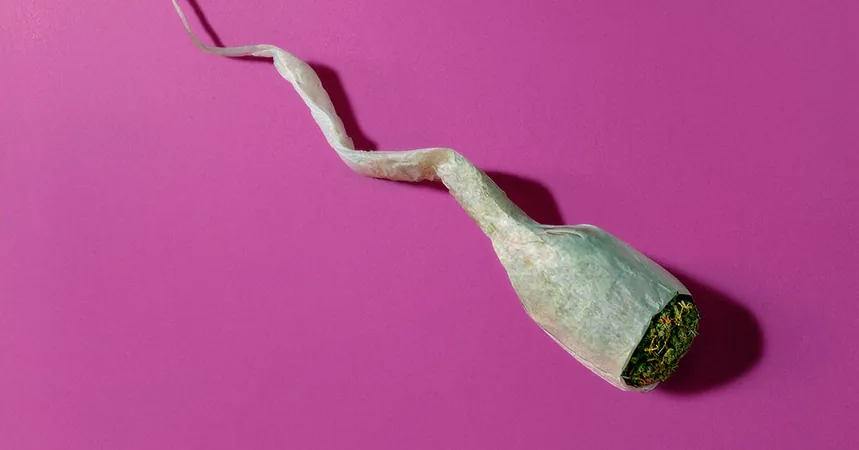
Is Your Cannabis Habit Harming Your Sperm? Here’s What Research Reveals!
2025-04-07
Author: Chun
Over the past decade, an increasing number of men have turned to their doctors with a pressing question: Does using cannabis impact fertility? Dr. Alexander Pastuszak, a urologist and male fertility expert, initially found himself without clear answers. As cannabis legalization spread across the United States, understanding its effects on reproductive health became increasingly necessary.
Dr. Pastuszak, who is based at the University of Utah, began his quest for clarity, attributing the surge in inquiries to the changing societal norms surrounding cannabis use. He noted, “Until recently, the answer was, ‘I don’t know.’” This uncertainty was partly due to the challenges of studying cannabis, which remains illegal at the federal level.
Research indicates that many men may not realize the potential repercussions of cannabis use on their fertility. According to the Centers for Disease Control and Prevention, 52.5 million Americans reported using cannabis at least once in 2021, and studies collected by Dr. Pastuszak in 2019 revealed alarming connections between cannabis consumption and male fertility challenges, particularly due to the active ingredient THC (tetrahydrocannabinol).
How THC Impacts Sperm Quality
Experts have long recognized the negative effects of substances like tobacco and alcohol on male reproductive health, but the impact of cannabis has only recently been illuminated. THC can damage sperm cells, altering their shape and mobility and interfering with their genetic material. This is particularly concerning as research conducted in the 1990s identified a cannabinoid called anandamide, critical for reproduction, that may be disrupted by THC. This disruption can potentially hinder multiple sperm cells from fertilizing an egg successfully.
Notably, a troubling pattern emerged from recent studies: Dr. Pastuszak's review highlighted a significant association between cannabis use and decreased sperm counts, concentration, and abnormal sperm shape. A further study involving Jamaican men reported that just moderate cannabis use correlated with significantly higher instances of misshapen sperm, lowering the chances of successful conception.
Additional research from Jordanian men demonstrated that sperm motility, or the ability of sperm to swim effectively, was markedly reduced in cannabis users compared to both tobacco users and non-smokers. THC was shown to harm the mitochondria within sperm cells—often considered the cell's "engine"—thus impairing their ability to reach and fertilize the egg.
In animal studies, evidence emerged that parental cannabis use could also negatively impact offspring development. A 2020 study at Duke University found that cannabis exposure in male rats led to adverse effects on their offspring’s brain development.
What Can Be Done?
In addition to directly affecting sperm health, cannabis use may trigger other sexual health issues, including erectile dysfunction and reduced sexual desire, even with infrequent use. As Dr. Ryan S. Sultan from Columbia University warns, “Chronic high-dose use may contribute to erectile dysfunction, delayed ejaculation, and diminished long-term sexual desire.”
Experts suggest that men looking to conceive should consider abstaining from cannabis for at least three months prior to trying to conceive, according to Ryan Vandrey of Johns Hopkins University. This period allows the body to recover and may improve sperm quality.
Though it's essential to note that many men who are regular users still manage to father children, the risks cannot be ignored. Dr. Sultan recommends exploring alternatives, such as edible or vaporized cannabis, which may pose fewer harmful effects compared to smoking but still deliver THC into the system.
For those concerned about fertility, consulting with a fertility specialist is advisable alongside maintaining a healthy lifestyle, which supports overall reproductive health. Ultimately, cutting out cannabis entirely is the best approach to minimize potential sperm damage.
In conclusion, while cannabis remains a popular choice for many, understanding its implications on fertility is vital for men considering starting a family. The evidence is growing, and it warrants careful consideration before proceeding with conception.


 Brasil (PT)
Brasil (PT)
 Canada (EN)
Canada (EN)
 Chile (ES)
Chile (ES)
 Česko (CS)
Česko (CS)
 대한민국 (KO)
대한민국 (KO)
 España (ES)
España (ES)
 France (FR)
France (FR)
 Hong Kong (EN)
Hong Kong (EN)
 Italia (IT)
Italia (IT)
 日本 (JA)
日本 (JA)
 Magyarország (HU)
Magyarország (HU)
 Norge (NO)
Norge (NO)
 Polska (PL)
Polska (PL)
 Schweiz (DE)
Schweiz (DE)
 Singapore (EN)
Singapore (EN)
 Sverige (SV)
Sverige (SV)
 Suomi (FI)
Suomi (FI)
 Türkiye (TR)
Türkiye (TR)
 الإمارات العربية المتحدة (AR)
الإمارات العربية المتحدة (AR)